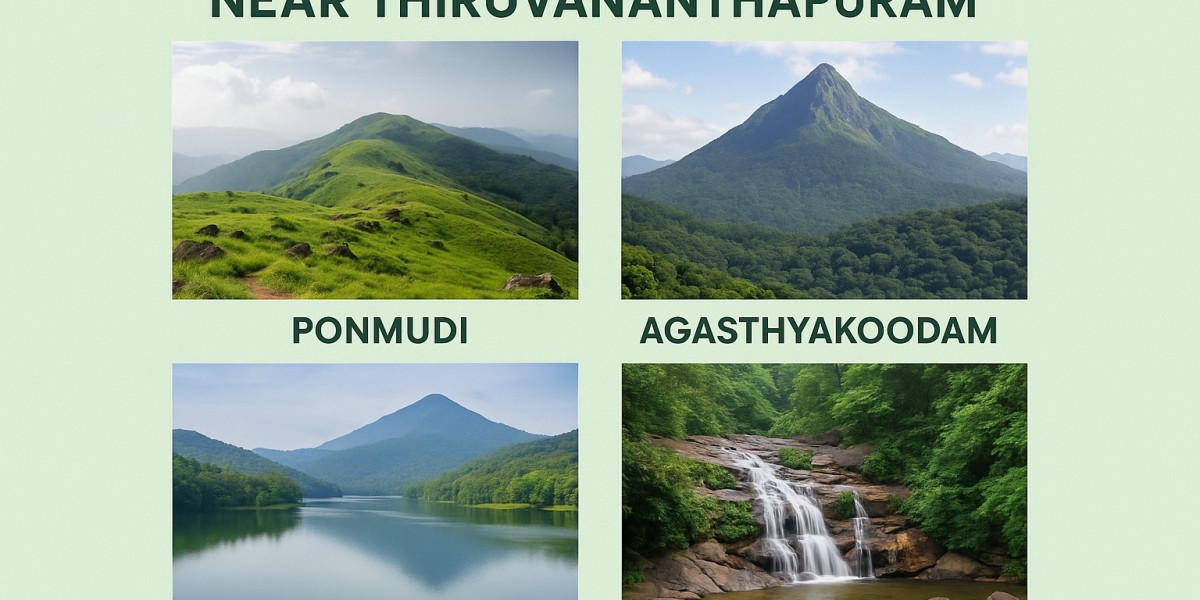Reconnect with Nature Just a Short Drive from the City
If you’re craving a quick escape from city life but want something more meaningful than a resort stay, eco-tourism near Thiruvananthapuram is your answer. With its lush hills, backwaters, forests, and coastline, this region offers you an immersive, environmentally responsible travel experience.
Whether you're looking to trek through the Western Ghats, kayak through mangrove forests, or camp by a lake, these handpicked destinations will reconnect you with nature — and yourself.
1. Thenmala Eco-Tourism
Distance from Thiruvananthapuram: ~70 km
Best time to visit: September to February
Thenmala is India's first planned eco-tourism destination, and it offers the perfect balance of adventure and serenity. As you walk through forest trails or try your hand at rope climbing and boating, you’ll realize this isn’t your typical tourist spot — it’s a journey into the heart of sustainable travel.
What to Do:
Canopy walks through the forest
Trekking and mountain biking
Boating in the reservoir
Visit the Butterfly Safari and Sculpture Garden
Travel Tip:
Book activities online through the official Thenmala Eco-tourism website to avoid waiting during peak weekends.
2. Agasthyakoodam Biosphere Reserve
Distance from Thiruvananthapuram: ~60 km to Bonacaud (base camp)
Best time to visit: January to March (trekking season)
If you're an avid trekker, this is the crown jewel of Kerala’s eco-tourism. Agasthyakoodam, the second-highest peak in Kerala, is a UNESCO-recognized biosphere reserve and part of the Western Ghats. The trail to the summit is only open for a few months each year and requires a permit, but the experience is unlike anything else in South India.
Why You’ll Love It:
Rich biodiversity (over 2,000 species of flora)
Sacred to Ayurveda followers — birthplace of sage Agastya
Eco-friendly trekking with strict visitor limits
Travel Tip:
Apply early for the trekking permit through Kerala Forest Department’s official site. It’s a protected zone, so plastic and loud music are strictly prohibited — and that’s a good thing.
3. Varkala Cliff and Coastal Trails
Distance from Thiruvananthapuram: ~45 km
Best time to visit: October to February
Varkala is often known for its beach, but the cliff area is part of an environmentally sensitive coastal zone that’s ideal for low-impact tourism. You can walk along the red laterite cliffs, explore lesser-known beaches, and dine at shacks that serve locally sourced food.
What to Do:
Cliff-side nature walks
Visit the eco-conscious Odayam and Kappil beaches
Yoga, wellness retreats, and Ayurvedic healing centers
Travel Tip:
Skip the busy weekends. Midweek visits offer quieter cliff trails and more intimate experiences with nature.
4. Kottur Elephant Rehabilitation Centre (KER)
Distance from Thiruvananthapuram: ~30 km
Best time to visit: November to March
Tucked inside the Neyyar Wildlife Sanctuary, the Kottur Elephant Centre is undergoing a massive eco-tourism makeover. Once completed, it will be India’s largest elephant care center, focusing on rehabilitation, not entertainment.
Why You Should Go:
Observe rescued elephants in natural settings
Learn about ethical animal care and forest ecology
Ideal for families with kids and wildlife lovers
Travel Tip:
Respect the sanctuary's no-noise policy. Early morning visits offer better chances to see elephants during feeding and bathing hours.
5. Poovar Backwaters and Estuary
Distance from Thiruvananthapuram: ~27 km
Best time to visit: September to March
This serene spot where the Neyyar River meets the Arabian Sea is a gem for eco-conscious travelers. With thick mangroves, floating cottages, and minimal commercial development, Poovar is a peaceful haven that showcases Kerala’s fragile and beautiful backwater ecosystem.
What to Do:
Canoe or kayak through the estuary
Visit the golden sandbar beach
Stay at eco-resorts using solar power and sustainable waste practices
Travel Tip:
Choose non-motorized boats where possible. They’re quieter, better for the ecosystem, and give you a more immersive experience.
6. Meenmutty and Kombaikani Waterfalls (via Kallar)
Distance from Thiruvananthapuram: ~45 km
Best time to visit: Post-monsoon (September–December)
Accessible via a forest trail starting near Kallar, these two waterfalls offer you a chance to hike through dense jungle under the canopy of the Peppara Wildlife Sanctuary. The trail is manageable for most people and perfect for a half-day eco-adventure.
Why You’ll Love It:
Offbeat and crowd-free
Rich birdlife and butterfly sightings
Natural swimming pools near the falls
Travel Tip:
Wear proper hiking shoes and avoid the trail during heavy monsoons. Carry all waste back with you — no bins here, and that’s how it should be.
7. Aruvikkara Dam and Reservoir
Distance from Thiruvananthapuram: ~16 km
Best time to visit: Early mornings, year-round
Often overlooked, Aruvikkara offers a peaceful alternative to more popular weekend spots. The dam and surrounding reservoir are great for early-morning walks, cycling, and casual birdwatching.
What to Do:
Cycle around the reservoir loop
Visit the ancient Bhagavathy temple nearby
Sip on fresh tender coconut under banyan trees
Travel Tip:
Best visited at sunrise or just before sunset for beautiful light and calm surroundings. Bring binoculars if you’re into birdwatching.
Sustainable Travel Tips
If you're exploring eco-tourism around Thiruvananthapuram, your responsibility doesn’t end at the trailhead. Here are some simple ways to stay environmentally mindful:
Carry reusable bottles and containers
Avoid single-use plastics
Respect wildlife and plants — no plucking, feeding, or touching
Stick to marked trails and stay quiet in forest zones
Support local eco-guides, farmers, and homestays
Final Thoughts
Thiruvananthapuram may be Kerala’s capital city, but just beyond its urban borders lie forests, rivers, cliffs, and coastal ecosystems worth preserving — and experiencing. Whether you’re in the mood for a forest trek, a quiet canoe ride, or an encounter with rescued elephants, eco-tourism around this region gives you the chance to travel with purpose.
So next weekend, instead of heading to another café or mall, grab your water bottle, hiking shoes, and eco-conscious mindset — and get ready to experience Kerala the way it’s meant to be: green, grounded, and gloriously wild.
And if you're traveling to Kerala from the U.S., platforms like Indian Eagle offer some of the best cheap flights from Atlanta to Thiruvananthapuram, making your sustainable adventure both affordable and accessible.
Travel greener, travel smarter — and let the land lead your way.







